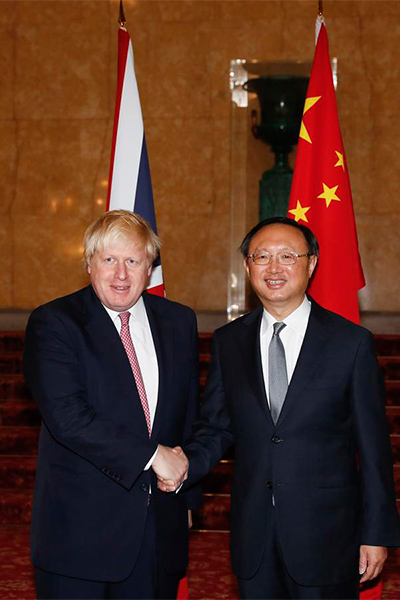
Visiting State Councilor Yang Jiechi (R) shakes hands with British Foreign Secretary Boris Johnson before the eighth China-UK Strategic Dialogue in London, Britain, on Dec 20, 2016. The eighth China-UK Strategic Dialogue, co-chaired by visiting Chinese State Councilor Yang Jiechi and British Foreign Secretary Boris Johnson, was held in London. [Photo/Xinhua]
LONDON — China and Britain on Dec 20 reaffirmed their commitment to a “golden era” for Sino-British bilateral ties amid Brexit uncertainty.
The latest mutual reassurance emerged as the eighth China-UK Strategic Dialogue was held in London. The dialogue was co-chaired by visiting State Councilor Yang Jiechi and British Foreign Secretary Boris Johnson.
Yang said that China stands ready to fully implement the important consensus reached by the two countries’ leaders along with the British side. The two sides should strengthen strategic communication, enhance political mutual trust and deepen mutually beneficial cooperation to promote the development of the bilateral ties as well as world’s peace, stability and development, he said.
Chinese and British leaders met on the sidelines of the G20 Summit in China in September, months after the Brexit referendum and British government reshuffle. Leaders of the two countries reassured each other of commitment and confidence in a “golden era” for bilateral relations.
Yang said that the two countries should have frequent exchanges at all levels, and advance pragmatic cooperation in various areas such as investment, trade, finance, innovation and infrastructure construction.
He also urged both countries to push forward people-to-people exchanges, and strengthen communication and coordination within a multilateral framework to solve regional and international issues.
On his part, Johnson said that his country is “unswervingly committed” to developing a strategic partnership with China and building the “golden era” for bilateral relations.
Johnson said Britain is willing to strengthen strategic communication with the Chinese side as well as advance bilateral cooperation in areas including economy and trade, investment, aviation and infrastructure construction.
Both sides also exchanged views on international and regional issues of common concern.
The two sides issued a joint declaration on the Afghanistan issue after the dialogue.
